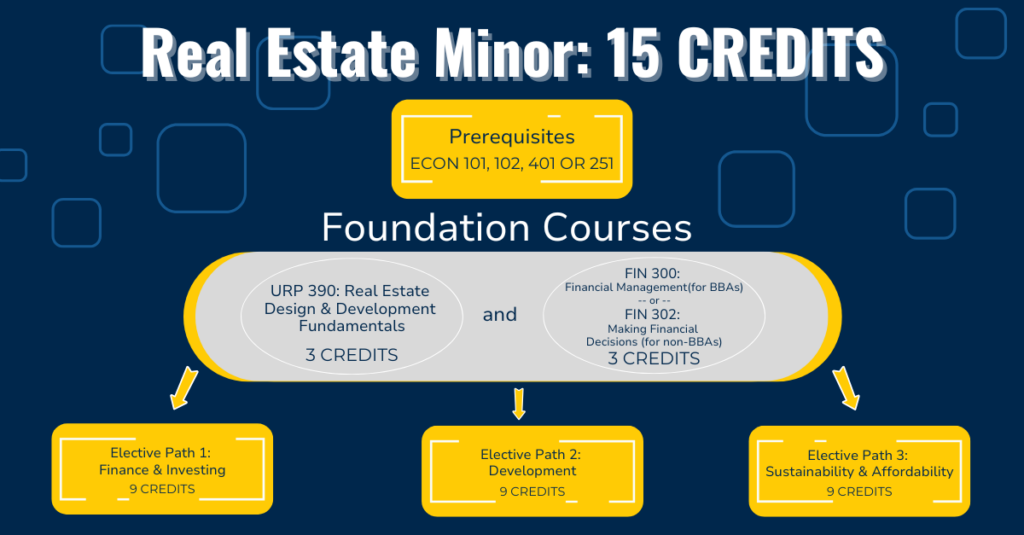Requirements
This minor requires a minimum of 15 credits in addition to prerequisites. Please note that course titles, listings and availability varies semester to semester. It is important to check course catalogs for each semester.

Prerequisites: See Course Listing Below
Students must complete at least one course in economics at the University of Michigan or obtain a waiver from their home unit due to previous courses or mastery of the subject.
| Course # | Program | Title | Credit Hours | Department/School |
|---|---|---|---|---|
| 101 | ECON | Principles of Economics I | 4 | LSA |
| 102 | ECON | Principles of Economics II | 4 | LSA |
| 401 | ECON | Intermediate Microeconomic Theory | 4 | LSA |
| 251 | ECON | Introduction to Statistics and Economics II | 4 | LSA |
Foundational Courses: 6 Credits
Foundational courses introduce students to the field of real estate and cities to ground future work with an understanding of market mechanisms. Students are required to take URP 390 and have the option of taking either FIN 300 or FIN 302 to satisfy the foundational requirements.
A financial management course provides a foundational understanding of rational decision-making using financial analysis and the ability to apply that framework to make investment decisions, allocate capital within an organization or firm, and assess risk.
The core course in Real Estate Development and Design (URP 390) is required, and provides the knowledge to understand real estate finance, underwriting, operations and management and the tools to be effective in shaping the built environment.
| Course # | Program | Title | Credit Hours | Department/School |
|---|---|---|---|---|
| 300 | FIN | Financial Management (BBA majors only) | 3 | ROSS |
| 302 | FIN | Making Financial Decisions (non-Ross students only) | 3 | ROSS |
| 390 | URP | Real Estate Design and Development Fundamentals | 3 | TAUBMAN |
Electives: A Minimum of 9 Credits
Effective Winter 2025, suggested tracks will be introduced to offer broad flexibility in completing the minor. Students will have the option to commit to a single track or move between multiple tracks as they elect their coursework.
Electives to complete the minor cover a range of disciplines to allow you to craft a course of study that fits your interests. From kinesiology to business to sociology, courses can be selected that assist in preparing you to be effective in a range of fields. Note that elective courses change from semester to semester so it is important to check the course catalog for the term and availability of classes.
Track 1: Development
| Course | Title | Credit | Department/School | Fall 2025 | Winter 2026 |
|---|---|---|---|---|---|
| FIN 419 | Real Estate Management | 1.5 | Ross | No | Yes |
| FIN 470 | Real Estate Financial Modeling | 1.5 | Ross | No | Yes |
| SM 440 | Sport, Economic Development, and Urban Revitalization | 3 | Kinesiology | Yes | Yes |
| SM 442 | Sport Venues and Real Estate Development | 3 | Kinesiology | Yes | Yes |
| BL 417 | Real Estate Law | 3 | Ross | No | Yes |
| URP 423 | Intro to Urban and Environmental Planning | 3 | Taubman | Yes | Yes |
| URP 439 | Sustainable Design and Construction in Real Estate | 3 | Taubman | Yes | No |
| URP 498 | Affordable Housing Development in Practice | 3 | Taubman | Yes | No |
| CEE 331 | Construction Contracting | 4 | Engineering | No | Yes |
| CEE 402 | Professional Issues and Design | 4 | Engineering | No | Yes |
| CEE 435 | Building Information Modeling | 3 | Engineering | Yes | No |
| URP 499 | Is a Career in Real Estate Right for Me? | 2 | Taubman | Yes | No |
| URP 595 | Public–Private Partnerships | 3 | Taubman | Yes | No |
| URP 596 | Fundamentals of Real Estate Development | 3 | Taubman | Yes | No |
Track 2: Sustainability and Affordability
| Course | Title | Credit | Department/School | Fall 2025 | Winter 2026 |
|---|---|---|---|---|---|
| FIN 470 | Real Estate Financial Modeling | 1.5 | Ross | No | Yes |
| ARCH 357 | Architecture, Sustainability, and the City | 3 | Taubman | No | Yes |
| URP 423 | Intro to Urban and Environmental Planning | 3 | Taubman | Yes | Yes |
| URP 482 | Housing Systems | 3 | Taubman | No | Yes |
| URP 439 | Sustainable Design and Construction in Real Estate | 3 | Taubman | Yes | No |
| URP 498 | Affordable Housing Development in Practice | 3 | Taubman | Yes | No |
| CEE 537 | Construction of Buildings | 3 | Engineering | No | Yes |
| BL 417 | Real Estate Law | 3 | Ross | No | Yes |
| ENVIRON 407/ CEE 307 | Sustainable Cities | 3 | LSA | No | No |
| ENVIRON 408 | Land Use Policy, Law, and the Environment | 3 | LSA | Yes | No |
| ENVIRON 350 | Introduction to Landscape Change | 3 | LSA | No | Yes |
| URP 499 | Is a Career in Real Estate Right for Me? | 2 | Taubman | Yes | No |
Track 3: Finance and Investing
| Course | Title | Credit | Department/School | Fall 2025 | Winter 2026 |
|---|---|---|---|---|---|
| FIN 466 | Real Estate Finance and Investments | 3 | Ross | No | Yes |
| FIN 402 | Real Estate Fund | 1.5 | Ross | No | Yes |
| FIN 419 | Real Estate Asset Management | 1.5 | Ross | No | Yes |
| FIN 470 | Real Estate Financial Modeling | 1.5 | Ross | No | Yes |
| SM 341 | Sports Finance | 3 | Kinesiology | No | No |
| SM 440 | Sport and Economic Development | 3 | Kinesiology | Yes | Yes |
| BL 417 | Real Estate Law | 3 | Ross | No | Yes |
| ECON 487 | Urban Economics | 3 | LSA | Yes | Yes |
| ES 444 | Finance for Societal Good | 3 | Ross | No | No |
| URP 591 | Financing Real Estate Development | 3 | Taubman | Yes | No |
| URP 595 | Public–Private Partnerships | 3 | Taubman | Yes | No |
| URP 497 | Acquiring and Repositioning Real Estate | 3 | Taubman | No | No |
| URP 499 | Is a Career in Real Estate Right for Me? | 2 | Taubman | Yes | Yes |

